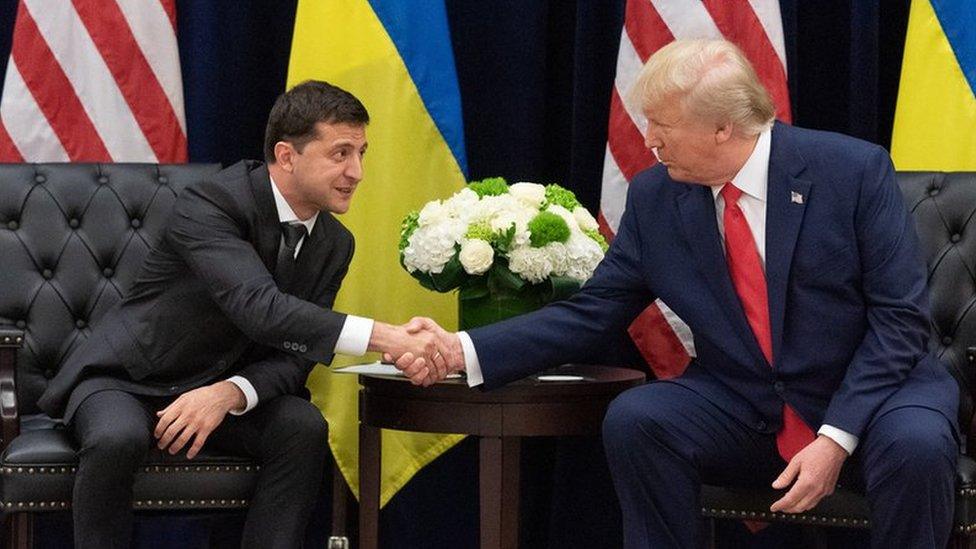Trump impeachment: Republicans storm secure hearing
- Published
Chaotic scenes as Republicans storm impeachment deposition
US Republicans have stormed a high-security impeachment inquiry into Donald Trump, forcing a witness to delay her testimony by five hours.
The Republicans chanted "let us in" as they forced their way into the hearing, breaching US House security rules.
This week, Mr Trump urged Republicans to "get tough and fight" for him.
Three committees in the Democratic-controlled House of Representatives are investigating allegations of wrongdoing by the president.
Democrats accuse him of illegally pressuring Ukraine to dig up dirt on a political rival, but Mr Trump and his supporters say he has done nothing wrong.
How did the chaos unfold?
About two dozen Republicans pushed their way into the secure meeting room - known as a Sensitive Compartmented Information Facility, or SCIF, on Wednesday morning.
Some brought their mobile phones in with them, leading Democrats and some officials to accuse them of a security breach.
SCIFs are built to prevent electronic eavesdropping, and allow people to review classified information. Electronic devices are not permitted.
Democrats and Republicans began shouting at each other, reports say, and the Republican protesters refused to leave the room for a number of hours, even ordering pizza at lunchtime.
The protest delayed the testimony of Laura Cooper, the Deputy Assistant Secretary of Defense for Russia, Ukraine and Eurasia, for five hours, although she resumed her testimony later in the afternoon.
Why did they barge in?
The Republicans argued that Democrats were conducting the impeachment inquiry in secret, with Representative Steve Scalise describing it as "a Soviet-style process".
"Every member of Congress ought to be allowed in that room. The press ought to be allowed in that room," he added.
The inquiry is led by a Democrat - Adam Schiff - and being run by the House Intelligence, Oversight and Foreign Affairs committees.
However, more than 40 Republicans are members of those committees, and permitted to take part in the hearings.
Democrats have argued that it is common for the initial stages of a congressional investigation to be conducted behind closed doors, and say private hearings are needed at the start, to stop witnesses from coordinating their testimony.
"The special counsels in the Nixon and Clinton impeachments conducted their investigations in private and we must initially do the same," Mr Schiff wrote in a letter to colleagues.
Why is this happening now?
Some commentators have argued that the Republicans, and Mr Trump, have come under increased pressure following Tuesday's testimony by the acting ambassador to Ukraine, Bill Taylor.
What does it take to impeach a president?
Mr Taylor testified that Mr Trump had made the release of military aid to Ukraine conditional on a pledge that his political rival, Joe Biden, would be investigated, and said relations with Ukraine had been "fundamentally undermined" as a result.
White House press secretary Stephanie Grisham responded in a statement: "President Trump has done nothing wrong - this is a co-ordinated smear campaign from far-left lawmakers and radical unelected bureaucrats waging war on the Constitution".
Democratic congressman David Cicilline described Wednesday's protest as "a stunt that corresponded very specifically to the president's complaint that they weren't fighting hard enough for him, and in direct response to devastating testimony... from Ambassador Taylor".
However, Republican Jim Jordan, who has taken part in the hearings, suggested that the protesters were simply fed up with the lack of transparency.
"It's finally reached the point where members just said they're so frustrated at the idea that they can't be a part of this and see what's going on," he told reporters.
- Published23 October 2019
- Published23 October 2019
